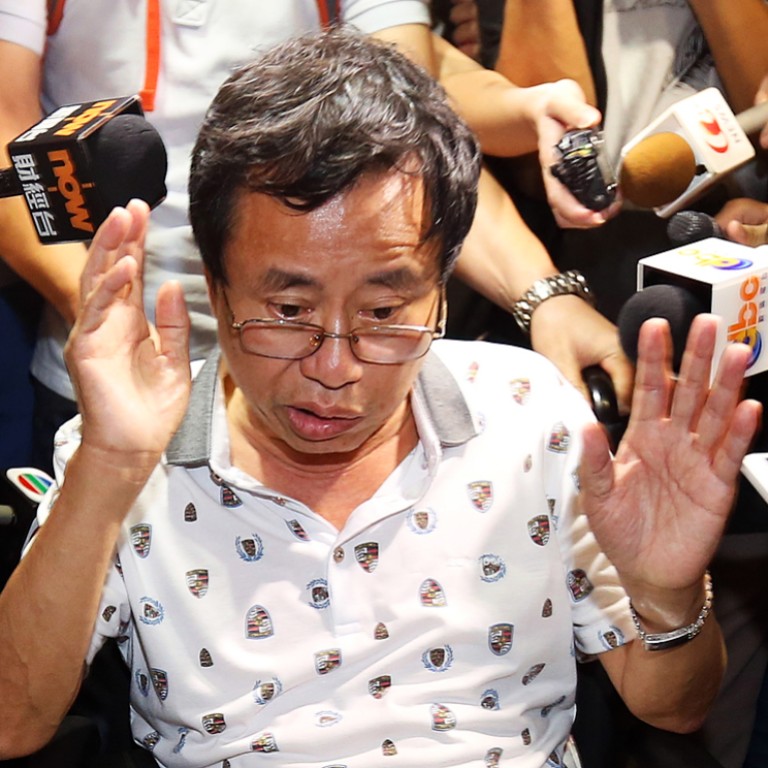
‘I’m not responsible for mainland China-made material’, says plumber in Hong Kong lead in water scare
A plumber at the centre of a lead-contaminated water scare at a Hong Kong public housing estate where pre-cast units imported from mainland China were installed said he could not be held responsible for material made outside the city’s borders.
A plumber at the centre of a lead-contaminated water scare at a Hong Kong public housing estate where pre-cast units imported from mainland China were installed today said he could not be held responsible for material made outside the city’s borders.
Being pushed in a wheelchair, Lam Tak-sum, the licensed plumber the government says is answerable for the scare at the two-year-old Kai Ching Estate in Kowloon City, met officials from departments including Water Supplies at Immigration Tower in Wan Chai today.
“The government should make clear who is responsible for what,” he said before meetings this afternoon. “My responsibilities only lie within Hong Kong’s borders. I cannot sign for things that happen outside Hong Kong and I can’t be held responsible for [the pre-made units].”
“I can’t say I have no responsibility in this issue,” he added. “And we haven’t talked about which part of the issue I should bear [responsibility for] and which part I don’t.”

Lam said he would consult his lawyer before deciding his next step. “If the government didn’t investigate the issue properly, then it’s their problem,” he added.
Lam earlier told Chinese-language newspaper that he was only responsible for the pipes connecting the water mains to the blocks’ water tanks.
Lam said the pipes connecting water tanks to households included pre-cast units imported from mainland China and were assembled by other contractors.
He also said samples were taken for tests from the sections he was responsible for and the results were satisfactory and then recognised by the Water Supplies Department.
But assistant director of Water Supplies Leung Chung-lap rebutted Lam’s claim, saying the plumber was also responsible for pipes connecting the water tanks and households.
“Records show that Mr Lam was responsible for the pipe from the water mains to water tanks, and also for the pipelines into the flats,” Leung said.
Six plumbing-related associations held a meeting to discuss the case at a Wan Chai restaurant this afternoon.
Spokesman Hugo Kan Kwok-leung, a former chairman of the Chartered Institute of Plumbing and Heating Engineering’s Hong Kong branch, said while it was uncommon to use pre-made parts from mainland China in water works, he said no matter where they were made, a plumber had the legal responsibility to follow the projects.
“The plumber needs to endorse the material list first before submitting it to the Water Services Department. Theoretically, an experienced licensed plumber knows what he is using and should be able to tell if the materials used on site are different,” he said.
Kan did not think at this stage the government was shifting its responsibility to Lam, as officials had merely stated facts. He said that chief contractor China State Construction also bears a degree of responsibility. The company said it had no comment on the incident.
Earlier, Secretary for Transport and Housing Anthony Cheung Bing-leung said that all fresh water pipes at the estate may have to be replaced after excessive levels of lead were found in some water samples.
“If some material not in line with our contract terms was used in some pipe connections, we worry the material was also used in other pipes,” he told RTHK.
“So pipe replacement is inevitable. But this will involve thousands of households so we will need a more complete proposal. We hope we can have a plan with the contractor this week,” he said.

The Kai Ching Estate has about 5,200 households in six blocks, according to the Housing Authority. The estate was opened in 2013.
Leung said the Water Supplies and Housing Departments would today take water samples from four other public estates where Lam installed pipes for tests.
Cheung meanwhile explained that Water Supplies Department officials identified Lam during a press conference on Saturday at the request of the media.
“It was actually the media that requested the government must reveal [the person],” he said.
The housing secretary said the director of Water Supplies was merely stating facts when revealing Lam’s name and the other projects he was involved in during the past two years.
A resident of the estate said during a DBC radio talk show today that tap water from her kitchen had smelt for quite some time.
Ms Wong, who said she had skin allergies and high blood pressure, said she had since got water from a roadside hose nearby.
“I am scared,” she said. “Initially I bought bottled water but it cost me HK$30 a day. This was very expensive.”
